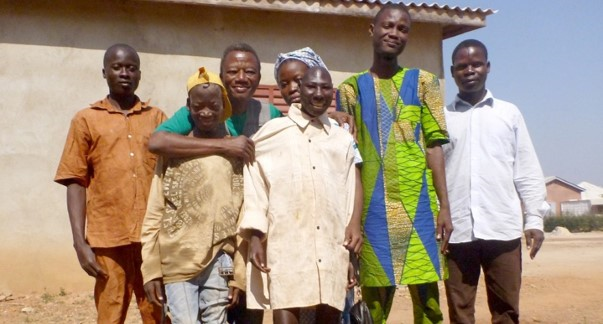Unlocking Understanding of Mental Health Stigmas
Story

Melanie couldn’t believe what she was seeing — a painfully thin man shackled to a tree in heavy chains. He was covered head to toe in dust, a dirty cup and bowl beside him. The chain was just long enough for him to stand up and hobble a few steps. He had lived like this for more than a year.
He and Melanie didn’t speak the same language, but his eyes told her how much he’d suffered and she felt an overpowering sadness in her heart she’d never known before.
Like many people facing mental illness here in Benin, West Africa, André* had been imprisoned under that tree by his family and neighbours.
Melanie Labelle-Royal, a Canadian volunteer and special educator with Cuso International, had committed to working with local communities and partner organizations to bring about long-term change where it was needed. Melanie volunteered at one of the St. Camille Association centres in the city of Djougou, dedicated to freeing mentally ill patients like André who have been held captive, providing them with compassionate treatment and helping them reintegrate into society.
Through her placement with Cuso International, Melanie was able to provide urgently needed professional training to St. Camille’s caregivers — all of whom had been patients here themselves.
Unfortunately, small communities like this do not have all the resources they need, like doctors and trained support workers, to compassionately respond to those suffering from mental health issues. In extreme situations, where public safety is thought to be at risk, villagers often feel they have no choice but to lock mentally ill men and women to trees for months and even years at a time.
Melanie’s work in Djougou was demanding, but also hugely rewarding. As a Cuso International volunteer, she represented Canadians who care about progressive healthcare and making life better for people in developing countries.
St. Camille is a very special place because not only does it treat patients who have been abandoned by their families, it also offers caregiver training to former patients. Both patients and caregivers are treated with medications not widely available at local hospitals and educated about appropriate dosages.
As well, patients are taught skills in weaving, baking and gardening to build self-esteem and help them reintegrate into village life. But by far the most important part of life here is the genuine concern and compassion shown to patients and caregivers alike.
With therapy, kindness and his own new found confidence, André’s health steadily stabilized. The caregivers encouraged his family to visit him here, and helped them understand that his illness is treatable if he continues to receive appropriate medication and support. In time, he was well enough to train as a caregiver, becoming a trusted member of the healthcare team. Eventually, he was welcomed back home and is now working full time, selling petrol in his village.
So far, more than 60,000 men and women have benefited from the centres in Benin and Ivory Coast. Gradually, word is spreading throughout the city and the whole country that St. Camille has the expertise to treat patients suffering from mental illnesses.
This kind of work is not for everyone. It can be emotionally exhausting sometimes, but Melanie saw so many lives like André’s change forever. When Melanie finished her placement she knew that what she had helped the community accomplish will have an impact for generations.
*The patient’s name has been changed to protect his privacy.
MAKE A DONATION AND HELP SEND MORE VOLUNTEERS WHERE THEY’RE NEEDED MOST